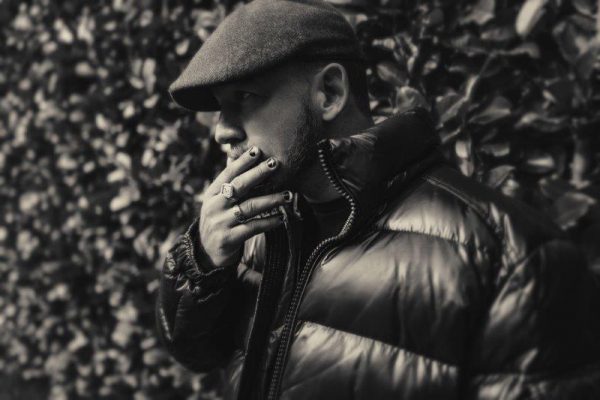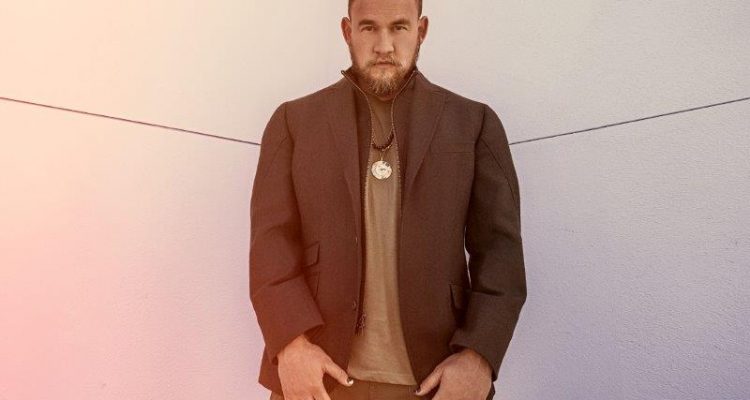Souleye is perhaps one of the most prolific, impactful and creative hip-hop artists of his generation with a staggering 12 studio albums and dozens of singles and EPs throughout his two-decade-long career.
It all started as a young boy growing up in New England when Souleye’s mother gave him a gift that has echoed throughout the rest of his life: his very first rap album, Rap Beginnings – Volume 1, which sparked his passion for the genre. By his teenage years, Souleye began freestyling and writing his own songs.
Cut to 20 years later, and he has written thousands of songs, poems, and verses, filling up libraries of journals with his words, and a dozen records. His very first albums include 2003’s Flexible Morality, which he wrote alone in the woods following the death of his best friend, and 2004’s UniverSoul Alchemy, after learning of his brother’s tragic suicide and extend to newer albums such as Iron Horse Running, WILDMAN, Shapeshifting, Soul School, and 2021’s hunting teardrops.

Souleye remains passionate about using his music to raise consciousness by focusing on themes such as self-discovery, spirituality, mental health and cosmic revelation. His songwriting reflects his radical authenticity and his advocacy for using the power of music to uplift and inspire others to elevated levels of consciousness.
He is also a master at lyrical wordplay, polyrhythmic verses, beatboxing, and rapid-fire freestyling, effortlessly shapeshifting across his tracks and albums.
In our new interview, Souleye shares where he draws inspiration for his music, and talks about his process of writing from a stream of consciousness, using music as his portal to expand his craft, himself, and his own consciousness.
His acclaimed new album, Disguised as Tomorrow, released just last month, features meditative and spiritual elements that “reflect a relaxed, introspective, reflective period after the globally traumatic experiences of the pandemic,” Souleye says.
Disguised As Tomorrow explores the idea that the ‘tomorrow’ we may anticipate for ourselves may not be the one that comes to pass, and in that can come new opportunities for personal growth not previously envisioned.
His expansive catalogue has been peppered with many collaborations, and his latest album is no different, featuring songs such as “Emergency” and “Sunlight” with his wife, seven-time GRAMMY Award-winning singer-songwriter Alanis Morissette; with fellow rappers Big Samir and Main Flow on “Letter To The Old Me” about the letters he would write to his younger and older selves; with South African artist Esjay Jones on “Protected;” and with Lila Rose on “The Unheard.”
“When it comes to collaborations, if I have a connection with another artist that I’m inspired by, it motivates me to want to work with them,” Souleye explains.

He frequently collaborates with artists with whom he says “share his wavelength,” and believes that music is a healing art. He sees music as eternal and something that will forever live on beyond our physical bodies, and views himself and his collaborators as conduits to create moments that people can share. “That’s one of the reasons I love making music. It’s an invitation.”
When asked how his songwriting has evolved over the years, Souleye says the trick is to no longer be so precious about the process.
“When I was younger, I almost felt like I needed to work hard on creating each song. Now I just surrender to the music, and let it just flow through me.”
However, he continually pushes himself in other ways, whether it’s in using new words or word groupings, or incorporating triplets and double time, exploring new paths with his voice as the instrument. He credits 50 Cent and Tupac as inspiring him to focus on tight and smooth transitions between choruses and verses.
“Tupac would always have these beautifully written verses, which were deep and thoughtful, and then go into sing-style of choruses. That was always my favorite.”
The through-line of his music remains the idea of finding a deeper connection and relationship with something outside of himself. For Souleye, having music to which others can relate creates a sense of community and connection for him.
“To have music you can relate to in some sense creates a relationship and experience. Sometimes it’s just the tone of the music, the extra drums or pianos or guitars. But then there’s the relationship with the tone of the artist, their voice, the words they’re using, the emotion behind them, and the story that’s being told. That’s why I’ve always connected with hip-hop artists who shared in that style, like Slick Rick, whose album title was literally called The Art of Storytelling.”
When asked what sets his music apart from that of other hip-hop artists, Souleye explains that he’s always been turned off by artists who use derogatory statements regarding women. “It just doesn’t feel like something I would ever want to record or have on repeat. I’ve always believed in music as a mantra with conscious and kind tones. I’ve never been one to really go into the studio and yell aggressively.”
In fact, his professional studio reflects this. Souleye says he likes to set the tone in his studio when he enters. He does this by lighting some sage, jumping up and down and focusing his intention. “In my studio I have crystals and a pothos plant that has beautifully taken over the entire ceiling. It almost feels like I’m in a jungle. Sometimes I’ll take my shirt off and just feel all, you know, tribal. It’s a sacred experience. I love that I can get in and have it on the daily. I’m almost addicted to my studio.”
He continues, “When I’m in the flow in my studio and I’m in this blissful space, it’s unlike any other experience I can have. It’s like a sacred time. Every time I write a rhyme, it’s exciting. I love that I have that there for me. It’s almost like a gift I’ve been given.”
Souleye’s music often incorporates themes of spirituality and self-discovery. He says this comes from being present and open in the moment. He sees the act of writing and recording as an altar. He also approaches his work from a place of gratitude and enthusiasm, even when the tone of the music is more somber.
Souleye says he draws inspiration from his daily experiences at home or on the road, conversations he’s had, and books he’s reading. He also credits the years he’s spent touring and working in the studio for shaping his artistic voice. He doesn’t focus on one particular moment but rather pulls from his entire life experience, seeing it all as a continual blessing and inspiration.
Over the years, his songwriting process has evolved to the point where he feels comfortable and in his zone. He’s developed a nice relationship with getting into a flow state and doesn’t experience as much back and forth with his inner critic as he did when he was younger. He also challenges himself creatively by collaborating with different producers and experimenting with new styles.
Souleye hopes his music can contribute to promoting mental health and well-being among his listeners by creating a space for vulnerability and authenticity. He wants his music to help people step out of their own minds and connect with him and with others on a deeper level. He also creates open-ended lyrics that allow listeners to have their own experience with the songs and encourages them to connect with his music on whatever level resonates with them.
Souleye’s music defies easy categorization, but that’s what makes it so compelling and unique. “I used to improvise and freestyle at every festival show I was at. I was so hungry to just practice my craft and study the ways of flow. And there were times where I would be on stage freestyling over bluegrass bands like Tea Leaf Green, or String Cheese Incident, or freestyling over drum and bass, or collaborating with the Glitch Mob on stage. I was also the lead singer for an instrumental house music electronic band at one point!”
He continues, “I would share my creativity and express myself through many different types of genres. I love to always push my style while still sticking to hip-hop because hip-hop was where I started and what I have loved the most.”
When asked what fans can expect next, Souleye says there is much more new music on the way, including a 10-year anniversary remix of the single he released with Morissette in 2012, “Jekyll and Hyde.”
He also has some great collaborations with visual artists such as Rob Prior and Mike Bundlie, and singles with hip-hop artists like Sunspot Jonz, Donny Arcade and Chachille. Souleye is also looking forward to being featured on Random Rab’s new single.
Check out his latest album, Disguised As Tomorrow, produced by Bill Bless, available now on Spotify and Apple Music. Follow him on Instagram @souleye.
Photos by Dennys Ilic @dennydenn
